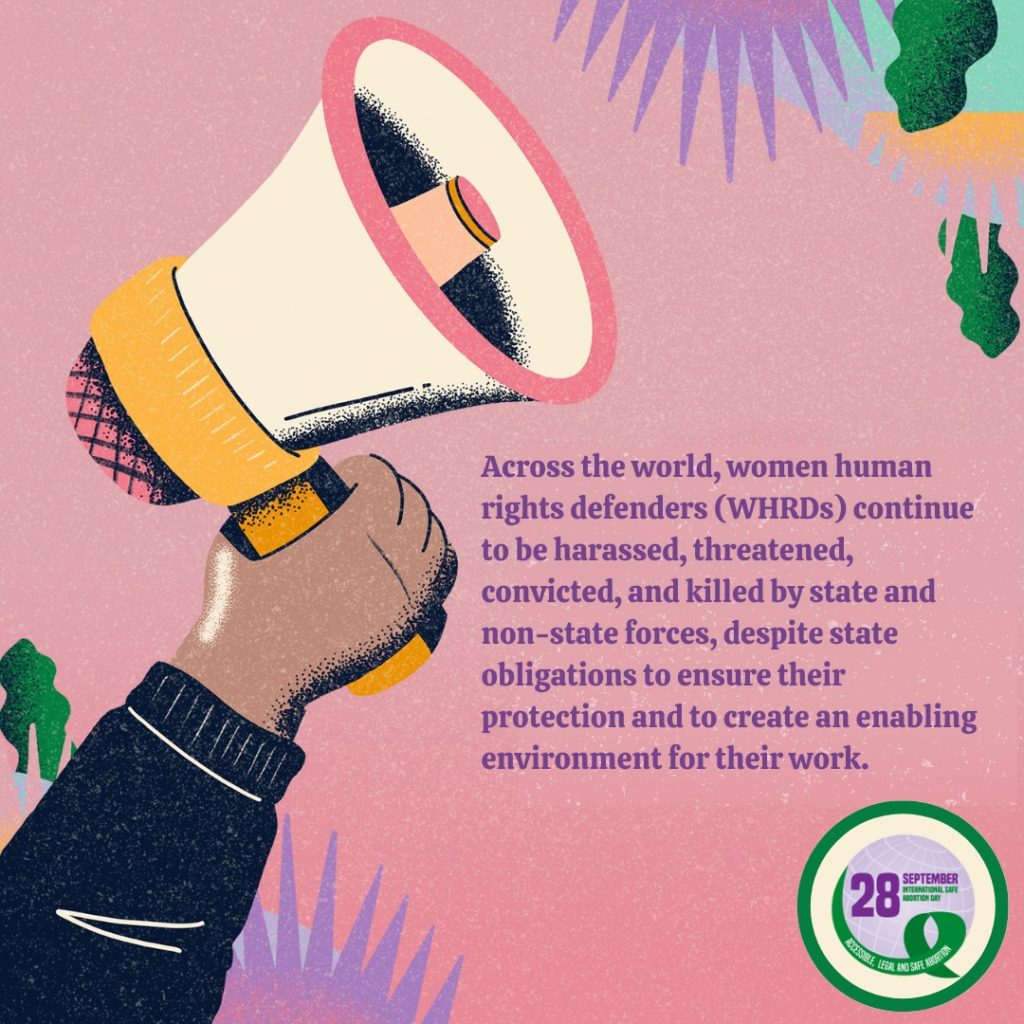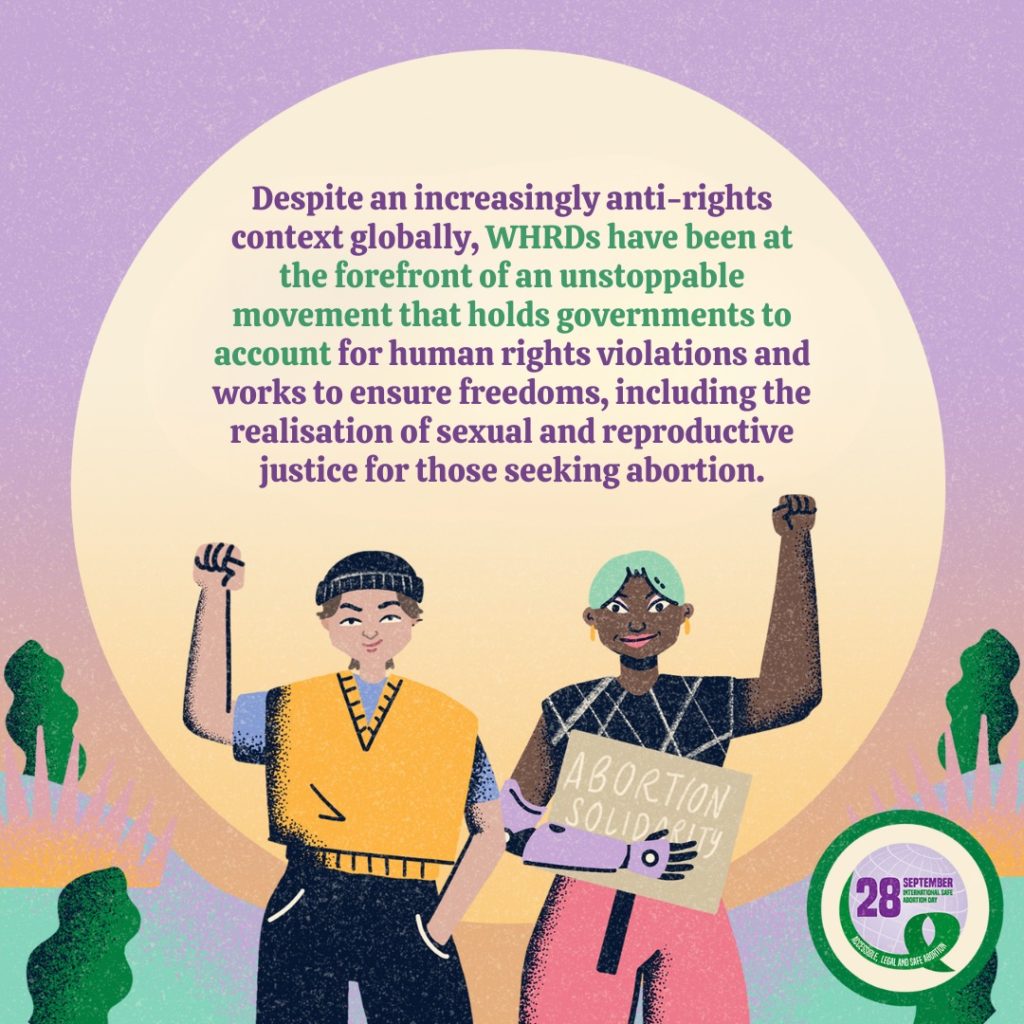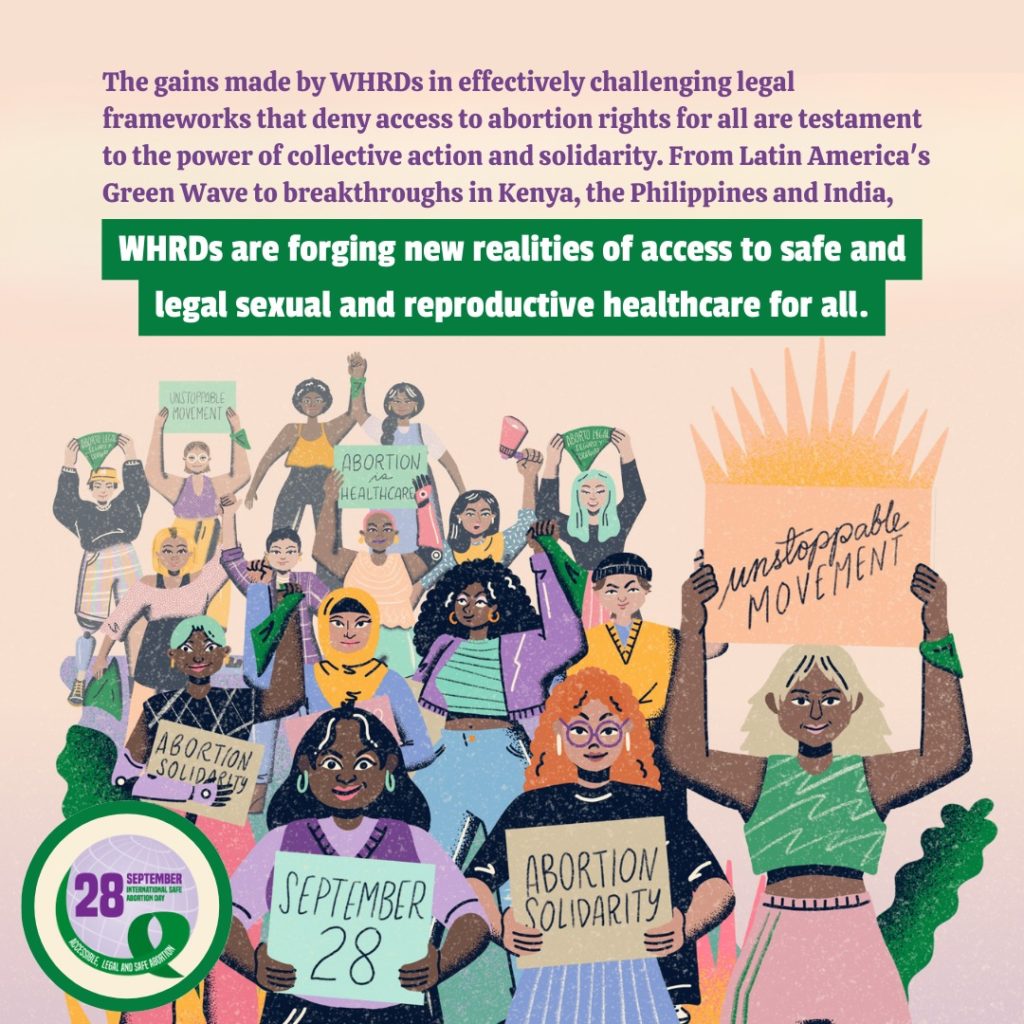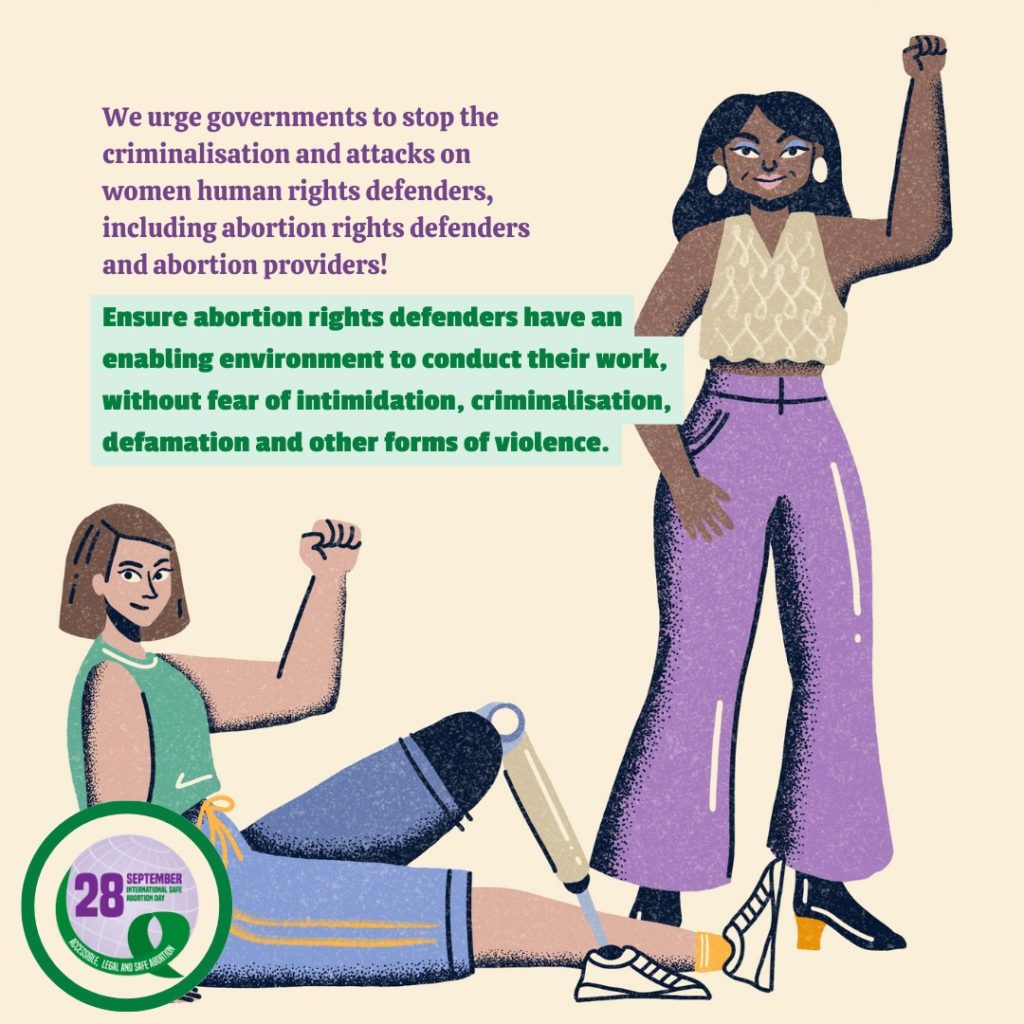Joint statement: Stop the attack on WHRDs defending abortion rights!
Across the world, women human rights defenders (WHRDs) continue to be harassed, threatened, convicted, and killed by state and non-state forces, despite state obligations to ensure their protection and to create an enabling environment for their work. This is especially the case for WHRDs defending abortion rights, who face fundamentalist opposition forces and are targeted in governments’ abuse of the law and law enforcement mechanisms to advance anti-rights and anti-gender agendas.
In 2020, Vanessa Mendoza Cortés faced three criminal defamation charges by the Andorran government after speaking about abortion rights and the situation of women and girls in Andorra at the UN Committee for the Elimination of Discrimination against Women (CEDAW) in 2019. Her case has been raised by international human rights groups in submissions to the UN Secretary General’s annual reprisals reports and in UPR reports in 2020, 2021 and 2022. She continues to face intimidation and judicial harassment, as well as the risk of a heavy fine and criminal record if convicted.
In 2021, the Inter-American Court deemed El Salvador responsible for the death of Manuela, a Salvadoran woman who was unjustly sentenced to 30 years in prison for aggravated homicide after suffering an obstetric emergency that resulted in her pregnancy loss and who died in prison two years later. The women’s rights groups and abortion rights defenders who work tirelessly to file appeals for pardon of women who, like Manuela, have been unjustly imprisoned for abortions, face consistent smear campaigns and criminalisation attempts.
Andorra and El Salvador remain two of the few countries in the world with total bans on abortion. Yet these are not the only states intensifying a climate of fear among women human rights defenders defending abortion rights. In March this year, a Warsaw court convicted and sentenced Justyna Wydrzyńska, co-founder of a local abortion rights group in Poland, to eight months of community service for helping a woman procure abortion pills. Since a near-total ban on legal abortion in 2020, the Polish government has vigorously increased prosecutions of those providing abortion care to pregnant persons, including women human rights defenders, a pursuit that Hillary Margolis, senior women’s rights researcher at Human Rights Watch, has described as a “witch hunt.”
Rising fundamentalism continues to spur a political climate that entrenches conservative and patriarchal societal norms. These norms give license to governments to investigate, surveil, harass, arrest and prosecute abortion providers and abortion rights defenders. Anti-rights groups continue to infiltrate human rights fora at both national and international levels to specifically target reproductive freedoms. This includes the weaponisation of the use of “gender” in UN policy spaces, thedemonisation of abortion rights defenders and women’s rights defenders more broadly, and the intentional stripping of abortion discourses from feminist analyses of power and invoking religious and cultural beliefs to justify denial of reproductive rights.
The detrimental impact of anti-rights movements on abortion rights was demonstrated last year in the United States (U. S.), when the U. S. Supreme Court ruled to end protections to the right of abortion, catalysing a rapid rollback on abortion rights across the country. Abortion is now totally or near-totally banned in 26 American states – more than half the country. The U. S. is one of only four countries in the world that have rolled back the right to abortion in recent years, joining El Salvador, Nicaragua and Poland.
Despite an increasingly anti-rights context globally, WHRDs have been at the forefront of an unstoppable movement that holds governments to account for human rights violations and works to ensure freedoms, including the realisation of sexual and reproductive justice for those seeking abortion.
In March last year, women’s rights groups in Kenya successfully expanded women’s access to safe and legal abortion through a High Court ruling that declared abortion-related arrests and prosecution illegal. The ruling was significant, because it decided a case involving both the right of a minor to receive reproductive care, as well as that of a medical professional to treat her, in a context where pregnant persons and healthcare providers continue to face harassment, wrongful arrest and intimidation in seeking and providing reproductive care.
The Green Wave in Latin America has been testament to the power of collective action and solidarity in decriminalising abortion and ensuring pregnant people have access to safe sexual and reproductive health care. The historic victories that have taken place in Argentina, Colombia, Ecuador, and most recently, in Mexico, are only as the result of the relentless action of women’s rights groups and defenders, who risk discrimination, stigmatisation and criminalisation as a result of their work.
In the last week, since 22 September, the Brazilian Supreme Court commenced the trial on decriminalisation of abortion up to 12 weeks of pregnancy, in which it will decide whether the articles of the Brazilian Penal Code that criminalise elective abortion are unconstitutional. If the action is approved, Brazil will join their Latin American neighbours and many other countries where pregnant persons can receive safe and legal abortions within the health system. We welcome this historic trajectory of change which will reduce the maternal mortality rate in the country and open the door for access to safe and legal abortion for all.
The Philippines, despite having one of the most restrictive abortion laws in the world without expressed provisions allowing exceptions, has also seen progress in recent years as a result of advocacy for the decriminalisation of abortion in the country. A petition with over 30,000 signatures and counting are supporting the decriminalisation of abortion. A draft bill has been initiated involving 130 individuals and 50 organisations from different sectors such as human rights groups and lawyers, women’s rights advocates and feminists, young people and academia, and is endorsed by civil society organisations (CSOs) as one of the priority CSO legislative agendas for the 19th Congress.
Furthermore, in India, the work of women’s rights groups have been crucial in creating conditions for the amendment of a 50-year-old abortion law in expanding abortion access to pregnant persons in 2021. These groups persist in advocating for a progressive, rights-based abortion law in the country.
The expansion of the work of anti-rights movements has grave consequences on the rights of all people to bodily autonomy, and disproportionately affects structurally excluded women, girls and gender non-conforming people. Abortion rights defenders are holding the line. In 2022, reproductive justice groups in South Africa successfully safeguarded access to safe abortion as friends of the court in a case opened by anti-abortion group Voice of the Unborn Baby NPC. Currently in Chile, over 200 human rights groups are joining forces to denounce the Republican party’s proposal to protect “the life of the unborn child and maternity” and ensure accessibility to safe and legal abortion.
WHRDs defending abortion rights continue to do critical work in ensuring access to reproductive health care for all and need to be supported, yet continue to face state-incited violence. We call on all governments to:
- Stop the criminalisation and attacks on women human rights defenders, including abortion rights defenders and abortion providers!
- Ensure women human rights defenders have an enabling environment to conduct their work, without fear of intimidation, criminalisation, defamation and other forms of violence.
- Work alongside abortion rights groups to support abortion seekers and ensure access to safe reproductive health care to all pregnant persons, including providing political and economic resources to reinforce and legitimise the work of abortion rights defenders.
- Decriminalise abortion and remove all legal and policy barriers to safe abortion, abortion management, and post-abortion care.
- Recognise that the realisation of all human rights is intersectional and reparations for colonialism, racism, climate injustice and other forms of oppression also require reparations for sexual and reproductive injustices against pregnant persons, including neglect and denial of abortion care.
- Address the structural barriers to access to sexual and reproductive health care and services faced by structurally excluded women, girls and gender non-conforming persons
- Take heed of the evidence available on the widespread impact that the rise of anti-rights movements has in undermining state capacity to respect, protect and fulfill human rights, as well as ensure women human rights defenders can enjoy freedom of association, expression and movement in order to carry out their legitimate work.
- Respect, protect and fulfill the reproductive rights of adolescents through the provision of comprehensive sexuality education in informal and formal education systems, and by recognising adolescents’ evolving capacities and removing third-party consent requirements for adolescents seeking abortion care.
We call on El Salvador to repeal the total ban on abortions and unconditionally release all persons in prison on abortion-related charges!
We call on Andorra to repeal their total ban on abortion and immediately drop all charges against WHRD Vanessa Mendoza Cortés!
We call on Poland to decriminalise abortion and the provision of abortion care and immediately stop their attacks on abortion rights defenders! We also call on Poland to immediately process the appeal of Justyna Wydrzyńska and unconditionally revoke her sentence!
We call on Chile’s Republican Party to abandon their attempt to impose laws that threaten women’s rights and roll back abortion rights in the country!
We urge the Brazilian Supreme Court to vote favourably in decriminalising abortion, thereby reducing maternal mortality and other avoidable health complications that may impact pregnant persons in the country.
We call on US governors to stop the rollback on abortion rights and protect the right to abortion care for all!
We urge all governments to implement these recommendations without delay and ensure justice for the WHRDs who are under attack for their legitimate work!
Sign on and amplify this statement. Get in touch with us now to sign the statement.




